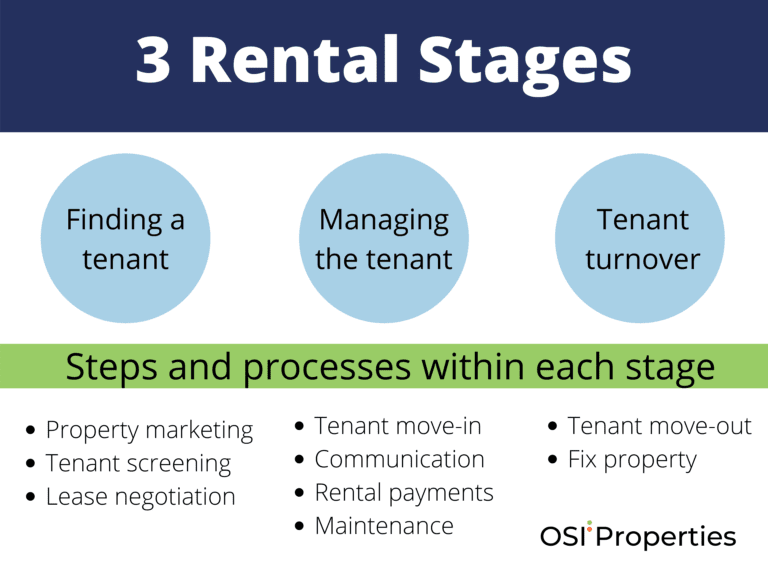Top 5 Mistakes Made While Managing Rental Properties
Introduction
Renting a property is a process with multiple steps. Each step has its own intricacies and pitfalls. While there are many good books and articles written on each aspect of the process, life has taught us that mistakes are our best teachers.
There are three stages in the property rental process:
- Finding a tenant
- Managing the tenant
- Tenant turnover
Within each stage, there are multiple steps that take place.

When we started in the rental property business, we didn’t have a system for each process. Consequently, the risk of not having a system is that when issues arise, you have to come up with a solution at the moment.
In this article I want to share some of the mistakes we made that made it possible to create the system we have today.
The Lessons
1 – Finding a tenant: Screen property managers adequately
After buying my first property, I decided to hire a property manager. The reason is I had no idea how the process of finding a tenant worked. The agent that helped me buy the townhome told me that she was also a property manager. She had done a fantastic job through the purchase process, why not also let her manage the property for me?
A few days after closing I noticed that the property was not in the market yet. Consequently, I had to follow up a few times until it finally was listed. Next, I realized the listing on the multiple websites had no pictures. The way that their system worked was that she would list it on her company’s website and add the pictures. But, those pictures were not being transmitted to websites like Apartments.com, Zillow, and the other ones. High quality pictures are probably the most important factor in a listing! A listing with no pictures is almost as bad as not having a listing.
After over a month she finally found us a tenant. The next year, once the tenant’s contract expired, I took over the management of the property.
In the end, no one will care about your property like you do. Your job is to find someone who at least cares enough to help you grow your business.
You can read more about this lesson in The First Deal: 2br/2ba in Lakeland
2 – Property Marketing – Answer quickly and pre-screen
If you market your property well, you will receive multiple inquiries. Unfortunately, many of those will be from people who are not qualified. While your first instinct will be to show the property to everyone and hope to rent it as fast as possible, that is not the right approach.
When I started managing my properties, I would take my time in getting back to prospect and try to schedule them to see the properties. There are 3 big flaws with this approach:
- We live in the NOW world. People want answers immediately and they want to find their rental now. If you take your time to get back, they would have forgotten about you.
- Not everyone is as professional as you. They will tell you that they will meet you at a certain time, only to not show up, or show up very late.
- They will see the property, love it, but then you’ll realize they are not qualified.
After being stood up multiple times, not received responses to all my late follow ups, and showing my properties to people who didn’t qualify, this is what I’ve learned:
- Have a pre-canned response to get back to prospects immediately. When they show interest in your listing, it means they are looking NOW for a property, and would like to find their ideal property NOW. After they show interest online (Zillow, Apartments.com, etc), you will receive a message along the lines of “Hi, I would like to schedule a showing for your property on 123 ABC street”. My response is: “Hi (name), thank you for your interest in 123 ABC. Please give me a call at (phone number) to schedule a convenient time for you to see the property”. An even better approach is to call them the moment you receive their message.
- Pre-screen them before scheduling a showing. When they call you or you call them, always ask “do you have any questions on the property”. Usually at that point they will ask about the requirements. If they don’t, ask them “are you familiar with the requirements of the property”. Even though I list the requirements on the listing, almost no one reads them. Once I go over the requirements, more than half of the people that call will say “oh wow, I don’t think I qualify. Thank you for your time” and hang up. I just saved an hour of their time, and mine.
- Follow up 30 minutes before the showing. Always confirm with the prospect before driving to the property. While most prospects are very professional and they meet you in time, some of them book a bunch of showing in the area, only to forget some. By following up 30 minutes before the showing I’ve saved many hours of my time (by now days…).
You can read more about this lesson in The Headache Property: 3br/2ba in Lakeland
3 – Tenant screening & property marketing: Don’t be desperate to rent a unit. An empty unit is better than a terrible tenant.
Having a vacant property is terrifying. Let’s assume the monthly rent on your property is $1,500. It means, that every day your property sits vacant, you are “losing” $50. Once your property starts to sit vacant for weeks you start imagining all the things you could have bought with all the money you are losing by not having your property rented. It makes sense that some people would get desperate and rent it out to the first person that shows interest. Well, we were one of those people.
One of our properties had been vacant now for over a month. At first we didn’t know how to take quality pictures of the property. Our marketing was not optimal, and this property in particular had a tenant leave in January, probably one of the worst times of the year to turnover a property. After showing the property to a few prospects, and lowering the price quite a bit, one guy showed interest.
We had him complete the application, ran his credit score, and background check. His income was lower than the minimum required, his credit score was well below our requirement, and his background check came with multiple concerns. The prospect said that he had the deposit and first month available and he was ready to move in the next week. We ignored our requirements and gave him the property, relieved that we would be able to finally start cash flowing.
A few months later he stopped paying rent, didn’t respond to any emails or phone calls, and disappeared. It took us almost a month to serve him notice to pay or leave.
When we went to check on the property to see what was going on, we were horrified. The whole placed hadn’t been cleaned probably in those 6 months, we found little bags of white powder in the bathroom, scratched all over the place, and a ton of debris. He had abandoned the property over a month ago, and instead of just telling us he decided to simply stop paying and leave.
After keeping his deposit, renting it to a new tenant, and fixing the place, we ended up losing more than the equivalent of 3 months of rent.
Stick with your process and don’t let emotions take over. One bad tenant can’t destroy years of profits.
You can read more about this lesson in The Roller-Coaster: 3br/2ba in Lakeland
4 – Communication/Maintenance – Fix issues immediately
When I used to be a tenant, one thing that always bothered me was when my landlord would take a long time to fix issues. My first property never had a single issue for years. But my second one had more issues than all the other ones combined.
While I could tell you many stories (most of them boring) on issues I had with this property, I think more importantly are the takeaways.
- Tenants don’t like to bother their landlords. When they reach out, it means the problem is serious
- Issues usually don’t go away by themselves, and the more you wait, the worse (expensive) it gets
- Try to fix things within 24hrs. Remember, if your tenant reached out, it means it’s serious and it’s bothering them
- An angry tenant is a tenant that won’t cooperate. Never get to that point
- In a tenant vs landlord conflict, the tenant will always win. Be very responsive and professional and keep documentation of every single interaction
- Ask your tenants to submit maintenance request online or in writing
You can read more about this lesson in The Headache Property: 3br/2ba in Lakeland
5 – Fix Property: Set expectations with contractors/technicians
Regardless of how perfect a property is, at some point it will need repairs and maintenance. In the ideal world, you will open an app, hire a contractor for the fair price of the job, and the contractor will come at the promised time and fix the issue quickly. Unfortunately, prices, professionalism, and quality vary quite a bit between contractors/technicians.
To help illustrate this point, let me tell you a quick story of one of our most recent remodeling jobs. We hired a contractor to replace all the doors. The contractor mentioned that it was a standard job, charged us what we thought was a good price (we later found out we overpaid), and he came with doors that had no paint. He installed them and quickly left. Correspondingly, we had to go through the painful process of painting each door, making sure to not ruin the walls and floor. Since then, we specify everything to the most minimal detail, and let the contractors know they will not get paid until the job is done to our satisfaction.
A few takeaways from our experiences are:
- Hiring from large and established companies is expensive. Established companies can provide good warranties, provide a fast service, and transparency. But you will pay for it.
- Let the contractor know exactly what you are looking for, to the most minimal detail. No detail is too small. Set your expectations up front.
- Don’t be afraid to push back or ask someone to come back and do the job well before paying. From our experience most contractors would prefer to be told what to fix than to receive a bad review online.
- Ask exactly how much the contractor will charge before coming to the property. It’s very typical for the contractor to not tell you the price until they are about to start working, or at the end! To avoid surprises, negotiate everything in the beginning and request approval for any addition or extra service.
- If you find a good and honest contractor, help him out by referring him for other projects. Promote excellence by helping those that provide a good and honest work.
- We now use Thumbtack to quickly hire contractors. It lets you compare prices before committing and gives you the opportunity to rate their work.
You can read more about this lesson in Our First Fixer-Upper Airbnb: 4br/2ba in Kissimmee




